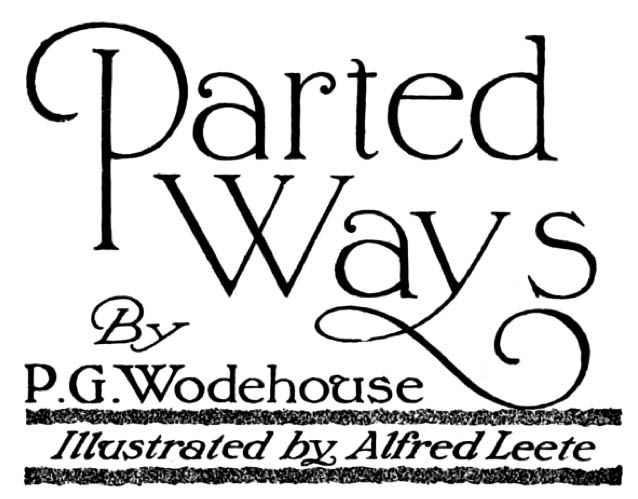
The Strand Magazine, December 1914
 HEN George Marlowe had been engaged
to Grace Pemberton a little more than a week he asked her a question. It was a
question which he had been trying to ask ever since the day when she had promised
to be his wife. A hundred times it had risen to his lips, and every time he had
swallowed it with a jerk. He was afraid. Her answer meant so much to him.
HEN George Marlowe had been engaged
to Grace Pemberton a little more than a week he asked her a question. It was a
question which he had been trying to ask ever since the day when she had promised
to be his wife. A hundred times it had risen to his lips, and every time he had
swallowed it with a jerk. He was afraid. Her answer meant so much to him.
“Dearest,” he said, ”have you ever written a story?”
“A story?”
“A magazine story, or a novel, or anything like that?”
“No.”
“Never?”
“Never.”
“And you don’t feel you want to?”
“Not in the least.”
George took her in his arms and kissed her in a kind of awed way. He could scarcely believe his good fortune. He was an author himself by profession, and in the circles in which he had moved all the women wrote profusely. It was his misfortune to dislike women writers. Everyone has some pet aversion—some dislike slugs, some cockroaches; George disliked women writers.
He had been quite prepared to hear that Grace wrote. Every day he had been bracing himself for the sudden production of a manuscript fastened together in the top left-hand corner with pink silk; and now, from her own lips, he had learned that his fears had been groundless.
George Marlowe belonged to the new school of writers, who write because they have the knack of writing, and because it is an easy way of making enough money to enable them to do the things they want to do. He cultivated no pose; he had no message; he simply wrote. Without exerting himself unduly he could earn more than enough to keep himself in comfort; and now that all these moving-picture companies were buying up the film rights of stories quicker than you could turn them out, the thing was a walk-over.
That was George on Literature. What he really lived for was golf.
It was her supreme plus-twofulness which had first appealed to him in Grace Pemberton. She was a magnificent golfer. She had been in the first six in last year’s Ladies’ Open Competition. She drove divinely, putted to perfection, and to watch her getting out of casual water was like looking at some beautiful picture by a great master. And she did not write. George was stunned by the thought that to him alone of men it had been vouchsafed to win the love of the ideal woman.
He looked down the vista of the years, and told himself that all was well. Trouble might come—no one realized more clearly than he his fatal tendency to slice his approach shots—but she would be near him in the hour of trial, urging him on. They would journey through life together, the perfect companions. As a bachelor, his putting had been execrable. Who could say what feats he might not perform on the green, helped by her sympathy and encouragement? And there was such perfect trust between them that they could venture to speak freely of each other’s faults. If his stance was wrong, she would not hesitate to tell him so for fear of hurting his feelings. He, on his side, could criticize her only blemish—a tendency to overdo the use of the niblick. It is on this frankness, this absence of subterfuge, that wedded happiness can alone be based.
Soul-mates—that was the word he was trying to think of. He and she were soul-mates.
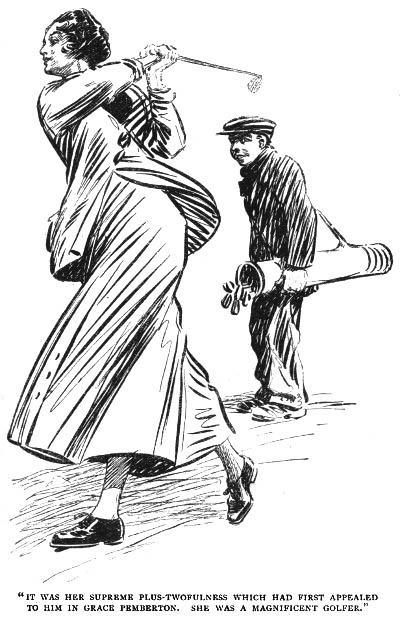
Life was very perfect during the first months after the wedding. They settled down to an ideal routine. In the morning George would go to his study, look at his typewriter, and decide to do no work till after lunch. After lunch and a leisurely pipe, off to the study once more, look at the typewriter, and decide to do no work till after dinner. After dinner there was no time for work, because the details of the day’s play had to be gone carefully over.
These golden epochs in our lives do not last. The world is too much with us. Serpents wriggle into our Edens. The one that wriggled into George’s was named Henderson Banks. He was George’s literary agent.
For some time this man had been making himself a perfect nuisance. Letters arrived from him almost daily, couched in a strain of unmanly querulousness. George, it seemed, had contracted to deliver a serial story by a certain date, and that date had come and passed. The editor was calling Mr. Banks up on the telephone every half-hour. Mr. Banks’s reputation was at stake. These and similar trivialities were the burden of the agent’s correspondence. It annoyed George, who was coming on rapidly with his putting and wished to concentrate undisturbed.
He made the serious mistake of introducing this man into his home. At the moment it seemed the only course. He could not find the time to answer all those letters, and he absolutely refused to go to London; so the only thing to do was to ask Mr. Banks down for the night. He arrived; and, as he came in at the door, peace flew out of the window.
Henderson Banks talked about writers and editors and publishers and prices per thousand words from the moment he arrived till the moment he left. It was his curious habit, when in conversation with one of his troupe of trained authors, to relate in detail all the big things he had done for all the rest of the troupe, together with full scenarii of all the plots of all their recent stories. He never listened to his victim’s remarks, and he never stopped for breath. He was one of Nature’s monologists.
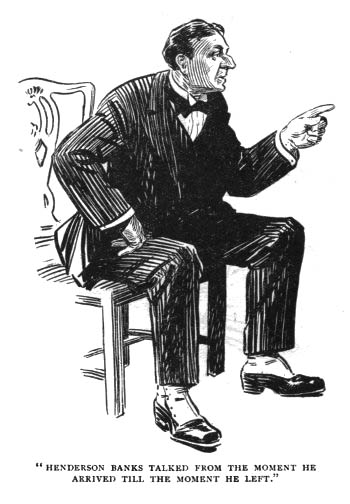
George was used to him, and had developed the faculty of ignoring the flow of information and thinking of other things. All the while that Henderson Banks was telling how he had fixed up Jones solid for three years with Blank’s Magazine and running over the main points of Jones’s forthcoming novel and going through all the plots of the twelve short stories which he had sold for Smith to the Asterisk, George was on the links, holing out in one under bogey. He was subconsciously aware that Henderson Banks was still in his midst, but that was all.
It was far different with Grace. This was the first time that she had ever heard the business of writing described intimately and at length. George never spoke of his work, and never seemed to do any. His attitude towards his profession was too off-hand to be inspiring. But Mr. Banks made it all seem so exciting. It was a delightful game, with the additional inducement of enormous prizes. Moreover, he made the thing appear so easy. Mr. Banks was an enthusiast, and it was no doubt unintentionally that he gave people the impression that the only thing you had to do to become a successful writer was to employ him as an agent.
Towards the end of his monologue he mentioned a name that drew an exclamation from Grace.
“Maud Blenkinsop! Does she write?”
“Write! She’s a genius.” All Mr. Banks’s clients were geniuses. “l’ve sold a series for her to——”
“Why, I was at school with her,” said Grace. “Nobody thought she was clever there.”
“I’ve got contracts for her whole output for the next two years at eight guineas a thousand words. But listen, I want to tell you the idea of this series. It’s wonderful!“
Grace was not listening. Her mind, like George’s, was far away. But while George had plunged into the future, she was roaming in the past. She was back at school, examining Miss Blenkinsop with a critical eye, and deciding that there was absolutely nothing in her mental equipment that marked her off from the rest of her peers. Yet here she was, an established writer. If Maud Blenkinsop—handicapped, now that she came to think of it, by red hair and a bad complexion—could do it, why could not——? She was absent-minded during the rest of dinner, and George, that night, when he spoke of James Braid’s lofting work, thought her manner strange.
“It’s a ghastly nuisance,” said George next day, “but I really shall have to start in again on that serial this morning. It seems to be rather pressing. Why don’t you have a round with the pro.?”
“I don’t think I will. I think I’ll stay indoors.”
George was touched. That his absence should actually make golf distasteful to her was a striking tribute.
“I sha’n’t take very many days over the thing,” he said. “I’ve got about half of it done, and the rest will be easy.”
“I shouldn’t hurry it, dear. Make it as good as you can. I sha’n’t be dull. I can find lots of things to do.”
George kissed her fondly.
And what did she do? She sneaked off to her room, sat down at the little near-Chippendale table, ate five chocolate creams, and began to write a novel.
In the old Greek tragedies it was a recognized rule that any episode likely to excite the pity and terror of the audience to too great an extent must be enacted behind the scenes. Following this admirable plan, I shall not dwell upon the spectacle of that so-soon-to-be-divided home. The thing is too poignant. I shall not describe the feverish energy with which George, hammering his typewriter, peeled off the chapters of the noxious chunk of wholesome magazine fiction which stood between him and the links. I could mention—but will not—how at intervals he sprang from his chair, seized a walking-stick, and executed a Vardon shot at an invisible ball; and then, remembering that every moment he wasted meant one more moment of dull inaction for Grace, leaped back into his seat and got home on the keyboard with a Gunboat Smith overhand swing which had the machine clinching and covering up in an instant. While, all the time, Grace, whom he imagined looking wistfully out of the window in the direction of the links, counting the minutes, was scratching away at her novel with a vim which made the undersized table vibrate like the A deck of the Lusitania.
These things are too strong meat for a gentle-souled public, so I omit them and skip to the moment when George, having brought his heroine and hero together with a click, leaped from his chair without even waiting to type “The End” with a couple of lines underneath it, and, snatching up his clubs, rushed from the room, yelling for Grace.
Grace, at that moment, had just taken a fresh sheet of paper and written on it the words, “Chap. XXIV.”
His clamour drew her from her work. She came downstairs. Her hair was rumpled, and her eyes had that far-away look.
“I’ve finished,” said George. “Grab your clubs, and let us get there in two jumps.”
“Clubs?”
Her voice was the voice of one slowly awaking from sleep. George felt a little chilled. He had anticipated the bright smile, the sparkling eye, possibly the joyful whoop.
“The idea,” he explained, gently, “was to get swiftly on to the first tee and push the ball into the next county.”
“Oh, do you want to play golf?”
George looked at her anxiously.
“Aren’t you feeling well, dear?”
Grace seemed to pull herself together with an effort.
“I had no idea you would have finished so soon.”
“I hurried the thing up. My hero and heroine were good for another twenty thousand words of misunderstanding, but I got them by the scruffs of their necks and made a whirlwind finish. I doubt if there has ever been a more surprised couple than they were when they found themselves suddenly showering kisses on each other in the moonlight.”
“George.”
There was a pause. Then Grace giggled. One would like to say that she gave a light laugh; but it was not a light laugh, it was a giggle—a furtive, sinister, shamefaced giggle, a giggle which froze George’s corpuscles with a nameless fear. He stared at her, and she giggled again.
“George, I want to tell you something. I know it sounds absurd, but I—I——”
“Yes? Yes?”
“I—I’ve been writing a novel, too.”
Strictly speaking, one ought to omit this scene as well. It is too painful. It takes hold of the sensibilities of the reader and ties them into knots. But there is not much more of it. Wince, but struggle on.
“You’ve been writing a novel!” said George, dully.
“I’ve just got to Chapter Twenty-Four.”
“You’ve just got to Chapter Twenty-Four!”
“So I can’t play golf this morning.”
“You can’t play golf this morning!”
Silence fell for a space—a silence broken only by George’s tense breathing. Then Grace spoke impulsively.
“Oh, George, dear, it’s nearly finished, and I really do think that some of it is rather good. I am going to read it all to you after dinner.”
George wandered blindly out into the sunshine, uttering little bleating sounds.
How strange it is, when things have gone awry, when Life, the pugilist, is battering us all over the ring, to look back at the comparatively mild beginnings of our misfortunes and remember how we thought then that Fate had done its worst. George, that night, fancied that his cup was full. Grace, he told himself, Grace, whom he had set on such a pedestal, had fallen. It was the limit, the extreme edge.
It was nothing of the kind. It bore the same resemblance to the limit that the first drop of rain bears to the thunderstorm.
He could not be blamed for the mistake. The acute agony which he suffered that night, from the “ ‘Parted Ways,’ a Novel, by Grace Marlowe,” to the “That’s as far as I’ve got—well, what do you think of it, dear? Honestly I really want your candid opinion” in the middle of Chapter Twenty-Five, was sufficient excuse for his blunder in supposing that he had drained the bitter cup to the dregs. He writhed unceasingly.
It was a horrible, an indecent production—not in the sense that it would be likely to raise a blush to any cheek but his, but indecent because she had put on paper in bald words every detail of the only romance that had ever come under her notice—her own. There it was, his entire courtship, including the proposal and the quarrel which they had had within two days of the engagement. In the novel she had elaborated this quarrel, which in fact had lasted almost exactly three-quarters of an hour, into a ten years’ estrangement, thus justifying the title and preventing the story finishing in the first five thousand words.
He marvelled how women could do these things. It made him, personally, feel as if he had been suddenly stripped naked while walking up Piccadilly.
Something of his feelings he wanted to put into words, but one glance at Grace told him that it was impossible. He would, he imagined, feel a certain shame if he ever hit or kicked Grace; but that shame would be as nothing to the shame he would feel if he spoke what he thought about “Parted Ways.” It would be murder.
“Great!” he croaked.
Her eyes were shining.
“Do you really think so?”
“Fine!”
He found it easier to talk in monosyllables.
“I don’t suppose any publisher would buy it.”
“Oh, well——”
There was consolation in that thought. He began to feel a little better.
“So what I am going to do is to pay the expenses of publication. Then it will be all right.”
George did not reply. He was staring into the middle distance, and trying to light an empty pipe with an unlighted match.
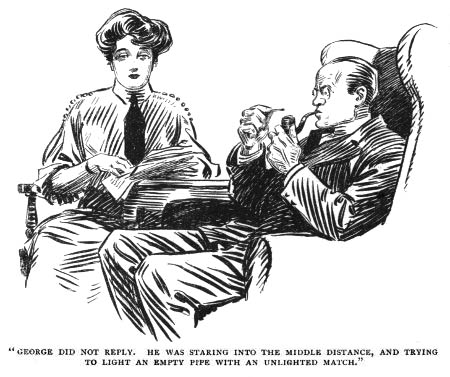
And Fate chuckled grimly, knowing that it had only just begun having fun with George.
Once in every few publishing seasons there is an Event. For no apparent reason the great heart of the public gives a startled jump, and the public’s great purse is emptied to secure copies of some novel which has stolen into the world without advance advertising and whose only claim to recognition is that the Bootle Intelligencer has stated in a five-line review that it is “readable.” You cannot manufacture these miracles—they just happen.
The rising firm of Mainprice and Bassett published a first edition of five hundred copies of “Parted Ways”; and when they found, to their chagrin, that Grace was only going to buy twenty of these—somehow Mainprice, who was an optimist, had got the idea that she was good for a hundred (“You can sell them to your friends”)—their only interest in the matter was to keep an eye on the current quotations for waste paper. The book they were going to make their money on was young Swaffham’s “Rose-Red Lips of Vivette,” in connection with which they had arranged in advance for a newspaper discussion on “The Sex Problem in Modern Fiction: Should there be a Censor?”
Within a month Swaffham was off the map. The newspaper discussion raged before an utterly indifferent public, which had made one of its quick changes and discovered that it had had enough of Sex, and what it wanted now was good, sweet, wholesome, tender tales of the pure, simple love of a man for a maid which you could leave lying about. And the particular tale which it selected for its favour was Grace’s “Parted Ways.”
It is these swift, unheralded changes of the public mind which make publishers stick straws in their hair and powerful young novelists go off and start writing comic scenarii for the movies. Up to the very moment of the change Sex had been the one safe card. Publishers’ lists were congested with scarlet tales of Men Who Did and Women Who Shouldn’t. And now the bottom had dropped out of the market without a word of warning, and practically the only way in which readers could gratify their new-born taste for the pure and simple was by fighting for copies of “Parted Ways.”
They fought like tigers. The offices of Mainprice and Bassett hummed like a hive. Printing machines worked day and night. From the rock-bound Hebrides to sunny Cornwall a great cry went up for “Parted Ways.” In every home in Greater London “Parted Ways” was found on the what-not, next to the wax fruit and the family photograph album. Clergymen preached about it, parodists parodied it, stockbrokers stayed away from the revues and cried over it. It broke like a tidal wave over the entire country.
And on the crest of the wave, breathless but happy, rode Grace. George? Oh, that’s George, spluttering down in the trough there, somewhere. We can’t be bothered about George now.
George, however, found ample time to be bothered about himself. He passed the days in a frame of mind which it would be ridiculous to call bewilderment. He was stunned, overwhelmed, sand-bagged. Dimly he realized that considerably over a quarter of a million perfect strangers were gloating over the most sacred secrecies of his private life, and that the exact words of his proposal of marriage were engraven on considerably over a quarter of a million minds. But, except that it made him feel as if he were being tarred and feathered in front of a large and interested audience, he did not mind that so much. What really troubled him was the alteration in Grace.
The human mind adjusts itself readily to prosperity. Grace’s first phase, when celebrity was new and bewildering, soon passed. The stammering reception of the first interviewer became a memory. At the end of a week she was talking to the Press with the easy manner of an empress, and coming back at notebook-bearing young men with words which they had to look up in the office Webster.
And the Quiet Smile——
“Mr. Marlowe is also an author, Mrs. Marlowe, is he not?”
“Yes. My husband—writes.”
And then the Smile.
George never saw the Smile, for he was never present at these interviews. But he sensed it. He was aware of it in the atmosphere of the home. That was her attitude towards him now—a pleasant, indulgent, patronizing smile.
She had soared above his low-browed enthusiasms. When he suggested the links she excused herself. She had letters to get off. People would keep writing to her, saying how much “Parted Ways“ had helped them, and she must answer. Autographs, too. She really could not spare a moment.
“But the Ladies’ Open Championship! You must get some practice.”
It had been settled between them during the honeymoon that this year she was to win the Ladies’ Open Championship.
“I’m afraid I shall have to give up any idea of that now.”
“Give it up!” gasped George.
“The date clashes with my lectures to the East Dulwich Progress Club on ‘Some Tendencies of Modern Fiction,’ ” said Grace.
In all great tragedies there is some one point at which the sufferer realizes the futility of further struggles, some one moment at which he definitely admits defeat. It came to George now. With a silent gulp he faced the truth. His idyll was ended. His marriage was a failure. There cannot be happiness where there is not respect, and, though he loved her still, he could not respect a woman who talked in that light way of the Ladies’ Open Championship.
Possibly it was the morbid lure which drags a murderer back to look upon the corpse that drew Henderson Banks, at this juncture, once more to visit the home he had wrecked. More probably, however, it was the thought of making ten per cent. on Grace’s future earnings. Be that as it may, he came whizzing. Barely pausing to tell her the plots of the last six novels he had sold for other clients, he urged Grace to place her affairs in his hands.
Grace received him warmly. She was grateful to him for having shown her, if unconsciously, the right outlet for her genius. Henderson Banks returned to London her accredited agent.
It seemed to George, brooding upon life in the course of solitary walks, that, dating from soon after this visit of Mr. Banks, matters became even worse than they had succeeded in being hitherto. Use had accustomed him to a Grace who found no fascination in golf; Grace at breakfast, pre-occupied and silent amidst a jungle of letters from admiring readers, he could look upon without active discomfort; and Time, the great healer, had taken the keener edge off the misery of the quiet smile. But Grace irritable, Grace with little lines of bad temper spoiling her forehead, Grace biting her under-lip and eyeing him with positive dislike when he spoke to her, was something new.
She had entered upon another phase—the worst, to date, of them all. It puzzled and worried George. He felt, not unjustly, that if there was to be irritability in the home, he was the person to supply it—not Grace. What, he asked himself, in his simple language, was her trouble? She was all right. She had sold over a hundred thousand copies of the only novel she had ever written. Newspapers published her photograph; schoolgirls wrote for her autograph; reporters treated her as respectfully as a heavy-weight pugilist. What more did she want? The injustice of the thing bore heavily upon George.
“What’s the matter?” he asked, abruptly, one morning, observing across the breakfast-table a sudden deepening of the perpendicular line which had now taken up fixed-post duty between her eyebrows.
“What do you mean?”
“You’re worried about something.”
“No.”
“Certain?”
“I’ve got a headache.”
A few months back George would have become volubly sympathetic. Now, he merely fiddled silently with his roll. Becoming aware that Grace was watching his movements with a kind of tense fury, he suspended them, and there was an uncomfortable pause.
“I’m sorry,” he said.
“So am I,” said Grace.
It was not encouraging.
Presently she gathered up her letters and left the room. George lit a meditative pipe.
The result of his meditations was to send him, an hour later, laden with remorse and all the patent headache remedies which the local chemist could supply, to Grace’s room. He had examined the situation squarely, and had come to the conclusion that he was a brute, practically a fiend. Had his manner during the recent interview been tender and sympathetic? It had not. He had looked like a stuffed frog and spoken like a bored policeman. He had conveyed the impression that he did not believe that she had a headache, that, if she had a headache, it was her own fault, and that, anyway, it was nothing to do with him.
He loathed himself. He was beyond the pale. He was the sort of man you read about in the character-study novels, the chap who breaks his wife’s heart with his cold inhumanity.
Grace was sitting at her table, a pen in her hand. She looked at him with weary eyes.
“Oh, what is it now?” she said.
There are some speeches before which amiability wilts like a stricken flower, affection hits the resin with a thud, and the milk of human kindness is turned off as with a tap. The “Oh” was bad; the emphasis on the “is” was worse and the “now” had all the quality of a well-directed punch on the solar plexus. George’s remorse left him.
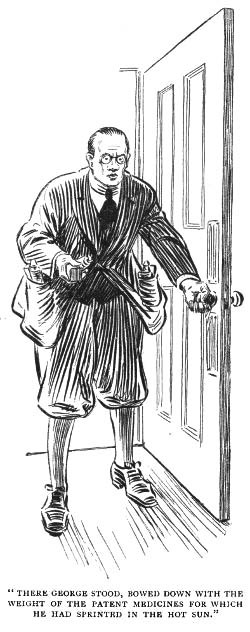
He was hurt and angry. There he stood, the human pack-mule, bowed down with the weight of the patent medicines for which he had sprinted a quarter of a mile in a hot sun; and all she had to say to him was, “Oh, what is it now?”
There have been dignified men in the world before, and there will be dignified men again; but none will surpass the dignity which George achieved at that moment. Pale and silent, he took the packages from his pockets one by one, and laid them on the table. His manner was a sublime blend of the martyr at the stake, pained but uncomplaining, and the conjurer producing rabbits from a hat.
“I am sorry to disturb you,” he said. “I brought you these for your headache.”
And he turned to leave the room.
Grace burst into tears.
“Oh, George!” she said.
There are some speeches before which dignity melts like ice in August, resentment takes the full count, and the milk of human kindness surges back into the aching heart as if the dam had given way. Of these “Oh, George!” is one of the most notable.
The only flaw in George’s happiness, as he knelt beside her, babbling comforting words, was the firm conviction that Grace would lift the entire scene, dialogue and all, and use it in her next novel; and it was for this reason that, when he could manage it, he censored his remarks to some extent. But, as he warmed to his work, he forgot caution altogether, and by the time he had finished he had committed himself to about two thousand words of a kind calculated to send Mainprice and his partner Bassett screaming with joy about their office.
“Oh, George!” said Grace.
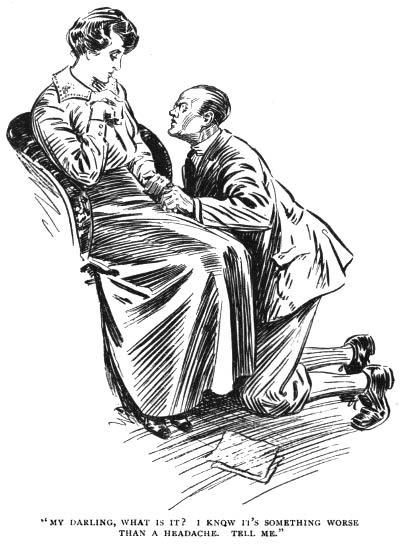
“My darling, what is it? I know it’s something worse than a headache. Tell me.”
Grace gulped. Then she spoke :—
“It’s Mr. Banks.”
“I’ll murder him. I ought to have done it ages ago. One keeps putting these things off. What has he done?”
“He has been fixing me up solid.”
“Fixing you up solid?”
“Yes, with everybody. He has arranged for me to do three more novels and I don’t know how many series of short stories. And they’ve been sending me cheques in advance, millions of them. What am I to do?”
George reflected.
“Cash them,” he said.
“But afterwards?”
“Spend the money.”
“But after that?”
“Well, it’s a nuisance, but after that I suppose you’ll have to write the stuff.”
“But I can’t! I’ve been trying for weeks, and I can’t write anything. And I shall never be able to write anything. I don’t want to write anything. I hate writing. I don’t know what to write about. I wish I was dead.”
She clung to him, sobbing.
“I got a letter from him this morning. He has just fixed me up solid with two more magazines.”
George kissed her tenderly. He was an author himself, and he understood. It is not the being paid in advance that jars the sensitive artist; it is the having to work.
“Drop the whole thing,” he said. “Grace, do you remember your first drive at golf? I wasn’t there, but I bet it travelled about five hundred yards, and you wondered what people meant when they talked about golf being a difficult game. After that, for ages, you couldn’t do anything right. And then, gradually, after a year or so of frightful toil, you began to get the knack of it. It’s just the same with writing. You’ve had your first drive, and it has been some smite. Now, if you’re going to stick to it, you’ve got to do the frightful toil. What’s the use? Drop it.”
“And return the money?”
“No,” said George, firmly. “There you go too far. Stick to the money like glue. Clutch it with both hands. Bury it in the garden and mark the spot with a cross.”
“Then what about the stories? Who is going to write them?”
“I am. Dearest, when we were married I said to you, ‘With all my worldly goods I thee endow.’ They include an historical novel of life at the Court of Louis XI., which even I have never had the gall to offer to any publisher. We will put your name to it, and sit back and watch Mainprice and Bassett sell half a million copies. As for the short stories, I’ve one or two stowed away somewhere. The others I suppose I shall have to write.”
His face clouded for a moment.
“It will cut into the mornings rather,” he said.
Then he brightened.
“But, by lunching early, we ought to be able to get in a couple of rounds in the afternoons.”
Editor’s notes:
It seems likely that it is no coincidence that Mainprice and Bassett share their initials with the real-life publishers Mills and Boon, then and now specializing in romantic fiction. Wodehouse’s only book published by them was the UK version of The Prince and Betty, which came out in 1912, two years before this story was written.
Compare the American magazine version of this story, from Pictorial Review in 1915; that version is slightly longer and may well be closer to Wodehouse’s original.
In 1930 Wodehouse revised this story under the title “Best Seller”; the character names and situations are somewhat changed, with the rift between the romantic leads being a broken engagement rather than an estrangement within a marriage, and with the leading man working as an assistant literary editor for a newspaper; he gets his dislike of women authors from his job of interviewing them. There is less emphasis on golf, too. But the main plot is quite similar and much of the text is retained.
Confusingly, there are two versions of “Best Seller” as well. As published in the June 1930 Cosmopolitan the story is told of George Mortimer Gossett and Evangeline Pembury. In the July 1930 Strand, the story begins in the Anglers’ Rest, and Mr. Mulliner narrates the story of his nephew Egbert, who replaces George Gossett. Other than the Mulliner frame, the 1930 magazine versions are very similar, with a few changes of names of publishers, newspapers, actors, and similar incidentals. The Strand version is substantially the same as the version in Mulliner Nights in both the American and British book publications.
Paul Kent (Plum’s Literary Heroes) found a probable inspiration for the earlier racy titles in the 1895 novel The Woman Who Did by Grant Allen.
 Madame Eulalie’s Rare Plums
Madame Eulalie’s Rare Plums